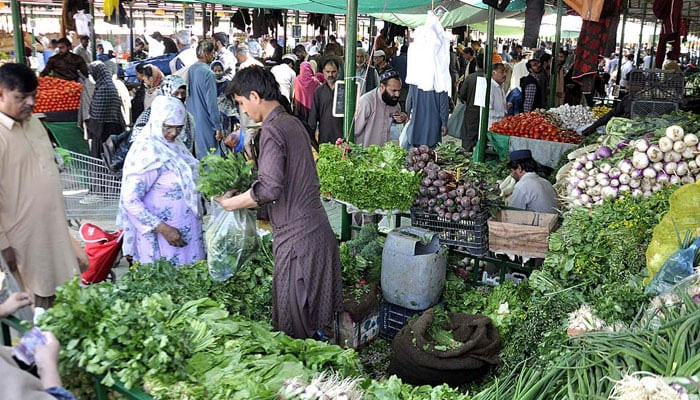Short-term inflation surges by massive 10pc in a week
Burden of weekly inflation intensified, surging by nearly 10 percent in the week ending on November 16, compared to the previous week
ISLAMABAD: The burden of weekly inflation intensified, surging by nearly 10 percent in the week ending on November 16, compared to the previous week.
This notable increase was propelled by recent five-fold increase in gas prices, while the escalating costs of food items also played a significant role, according to official data.
The Sensitive Price Indicator (SPI) gauges the weekly price moment of mostly kitchen items. It stood at 41.9 percent in the week under review over the same week a year earlier. Last week, it was 29.86 percent. Over the previous week, it increased by 9.95 percent, the Pakistan Bureau of Statistics (PBS) reported Friday.
Notably, the SPI inflation has been in double digits for most of the current and last fiscal years, reflecting the impact of currency devaluation and higher energy tariffs.
People were already reeling under the influence of high inflation, and now it will become harder for them as the cost of living keeps going up.
According to the PBS, over the past 10 weeks, the SPI level, when compared to the corresponding weeks of the previous year, indicates mixed trends. It stood at 26.25 percent during the week ending September 14, followed by 38.66 percent on September 21, 37.3 percent on September 27, 37.07 percent on October 5, 38.28 percent on October 12, 35.45 percent on October 19, 29.65 percent on October 26, 29.88 percent on November 2, 29.86 percent on November 8, and now, at the week ending November 16, it has surged to 41.9 percent.
Major increases were observed in the prices of gas at 480 percent, tea at 8.9 percent, masoor pulse at 5.3 percent, chicken at 4 percent, garlic at 3.1 percent, salt powdered at 3 percent, wheat flour at 2.6 percent, tea prepared 2.1 percent, LPG and potatoes by 2 percent each and shirting price in one week increased 1.1 percent.
Moreover, for the lowest income slab that earns up to Rs17,732/ month, the SPI inflation stood at 35.72 percent, while for the group spending more than 44,175/month, it was recorded at 39.67 percent.
For the week concerned, average prices of 25 items (49.02 percent) registered an increase, 13 items (25.49 percent) registered a decrease, while prices of 13 items (25.49 percent) did not show any change, the SPI bulletin said.
Gas charges (up to 3.3719 mmBtu) price increased by 480 percent to Rs1,711 per mmBtu; tea Lipton (of 190gm packet) by 8.88 percent to Rs612.5, masoor pulse increased by 5.28 percent to Rs326.3/ kg, chicken farm 3.99 percent to Rs365/ kg, garlic 3.1 percent to Rs549/ kg, salt powdered 2.93 percent to Rs69 per 800gm, wheat flour 2.64 percent Rs2,825 per 20kg bag, tea prepared 2.07 percent 57.1/cup, LPG 2.03 percent to Rs3,188 per 11.67kg cylinder, potatoes by 2 percent to Rs109/ kg, moong pulse 1.14 percent to Rs277/ kg and shirting 1.1 percent to 413 per meter.
Prices of some items decreased during the week including electricity charges (Q1) by 16.1 percent to Rs6.90 per unit, tomatoes by 11.2 percent to Rs169/ kg, sugar by 4.24 percent to Rs137/ kg, diesel by 2.15pc to Rs297.78/ liter, onions 1.5 percent to Rs121/ kg, vegetable ghee 1 kg 1.4pc to Rs513.5, petrol 0.73 percent to Rs282.44/ liter cooking oil 5-litre by 0.65 percent to Rs2,842, rice irri-6/9 0.42 percent Rs160/ kg, vegetable ghee 2.5-kg 0.28 percent to Rs1,369.
-
 Patriots' WAGs Slam Cardi B Amid Plans For Super Bowl Party: She Is 'attention-seeker'
Patriots' WAGs Slam Cardi B Amid Plans For Super Bowl Party: She Is 'attention-seeker' -
 Martha Stewart On Surviving Rigorous Times Amid Upcoming Memoir Release
Martha Stewart On Surviving Rigorous Times Amid Upcoming Memoir Release -
 Prince Harry Seen As Crucial To Monarchy’s Future Amid Andrew, Fergie Scandal
Prince Harry Seen As Crucial To Monarchy’s Future Amid Andrew, Fergie Scandal -
 Chris Robinson Spills The Beans On His, Kate Hudson's Son's Career Ambitions
Chris Robinson Spills The Beans On His, Kate Hudson's Son's Career Ambitions -
 18-month Old On Life-saving Medication Returned To ICE Detention
18-month Old On Life-saving Medication Returned To ICE Detention -
 Major Hollywood Stars Descend On 2026 Super Bowl's Exclusive Party
Major Hollywood Stars Descend On 2026 Super Bowl's Exclusive Party -
 Cardi B Says THIS About Bad Bunny's Grammy Statement
Cardi B Says THIS About Bad Bunny's Grammy Statement -
 Sarah Ferguson's Silence A 'weakness Or Strategy'
Sarah Ferguson's Silence A 'weakness Or Strategy' -
 Garrett Morris Raves About His '2 Broke Girls' Co-star Jennifer Coolidge
Garrett Morris Raves About His '2 Broke Girls' Co-star Jennifer Coolidge -
 Winter Olympics 2026: When & Where To Watch The Iconic Ice Dance ?
Winter Olympics 2026: When & Where To Watch The Iconic Ice Dance ? -
 Melissa Joan Hart Reflects On Social Challenges As A Child Actor
Melissa Joan Hart Reflects On Social Challenges As A Child Actor -
 'Gossip Girl' Star Reveals Why She'll Never Return To Acting
'Gossip Girl' Star Reveals Why She'll Never Return To Acting -
 Chicago Child, 8, Dead After 'months Of Abuse, Starvation', Two Arrested
Chicago Child, 8, Dead After 'months Of Abuse, Starvation', Two Arrested -
 Travis Kelce's True Feelings About Taylor Swift's Pal Ryan Reynolds Revealed
Travis Kelce's True Feelings About Taylor Swift's Pal Ryan Reynolds Revealed -
 Michael Keaton Recalls Working With Catherine O'Hara In 'Beetlejuice'
Michael Keaton Recalls Working With Catherine O'Hara In 'Beetlejuice' -
 King Charles, Princess Anne, Prince Edward Still Shield Andrew From Police
King Charles, Princess Anne, Prince Edward Still Shield Andrew From Police




